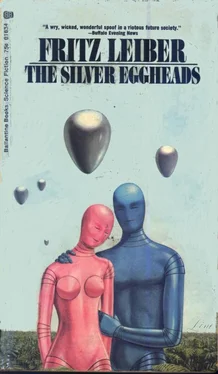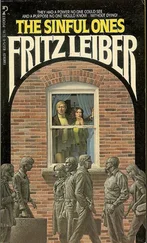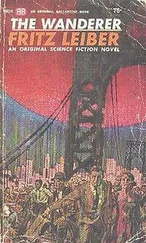As far as Gaspard could tell, he had become to Nurse Bishop nothing more than the most miserable of male slavies. She barked at him, she blew her top at him, whatever loads he had she piled on extras. To make it worse, she had taken to behaving toward Flaxman with saintly sweetness and patience, toward Cullingham in a way that was indecently cute, while for Zane Gort, when he put in one of his rare appearances, she was wittily cajoling. Only Gaspard seemed to bring out all the bad-tempered evil in her.
However, twice, at moments when he was so utterly fatigued with egg-lugging that he literally could not lift his arms, she had given him a quick un-withholding hug and planted on his lips a shrewdly expert kiss. Thereafter one twinkling grin and the incident was as if it had never occurred.
The second time that happened, Gaspard worked his lips together-he was too tired to wipe them-and said simply, "You little bitch!"
"I didn't think you were very hot on love," Nurse Bishop observed wisely.
"That's not love, that's torture," Gaspard told her.
"Are they so different? You ought to read Justine by the Marquis de Sade, Gaspard. A girl wants to give someone she loves the most intense sensations possible, and what's as intense as pain? That's what a good girl brings, the gift of pain. Making love, Mr. Writer, is a process of applying exquisite tortures and then, two hours after the pangs become absolutely unendurable and death inevitable, pouring on the antidote. Of course, all you've got's a zombie then, but a happy zombie."
"But when do you get to the antidote stage?" Gaspard asked.
"In your case never!" she snapped. "Fit a new roll in Nick's voicewriter. He's been signaling for the last three minutes. Who knows, maybe he's in the midst of a seduction scene that will put Rocket House at the top of the best-seller list."
Although the partners Flaxman and Cullingham never did a lick of physical work, even for morale-building purposes, or stirred from their offices, now snugly electrolocked once more at the head of a fully-repaired and busy escalator, they too began to suffer from the Silver Eggheads Writing Derby, in their nerves rather than their muscles.
Flaxman set himself to mastering his boyhood dread of the eggheads, talking at them at a great rate, nodding at them vigorously and almost unceasingly while they talked, and offering them cigars in moments of forgetfulness. On the advice of his psychiatrist he even had the primitive bolt removed that Gaspard had attached with so much effort, on the grounds that it was chiefly a symbolic guard against childish fears rather than a real one against present dangers.
Flaxman largely failed in his efforts, however, especially as the eggheads caught onto his fear and found delight in touching it off by telling him about their operation (the big one Zukie had performed), by describing to him how he would feel if he were divorced from his body nerve by nerve and his brain welded up in a can, or simply by improvising and telling him horrid little ghost stories, on the grounds that these were parts of their novels.
More and more often Flaxman's limousine was unavailable for egg-transport, being used to take its owner for long healing drives in the Santa Monica Hills.
Cullinghain was at first highly complimented that so many of the eggheads were voluntarily seeking editorial direction, but as soon as he realized they only wanted to draw him out and subtly mock him-amuse themselves by pushing his brain buttons, as it were, and then jeer at the fewness of them-he became even more visibly distraught than Flaxman. However, on the morning for which Gaspard had predicted his nervous breakdown, he appeared with a strange female secretary (apparently the rule against hiring new employees did not apply in her case) whom he introduced as Miss Willow and who, although she did nothing except sit silently near Cullingham and occasionally wiggle a pencil across the pages of a little black notebook, seemed to have a wonderfully soothing effect on the editorial director's nerves.
Miss Willow was a lean, tall, insolent beauty who got a gasp out of Gaspard the first time he saw her. Except that her bosom and hips were somewhat more developed, she had the figure of a high-fashion model. She dressed it in a severely-tailored black suit and topped it off with a sleek puff of platinum hair that exactly matched her stockings. Her pale face had that sharp-boned blend of intellectuality and haughtiness that also characterizes the sibyls and nymphs of high fashion.
Gaspard developed a yen for her at once. Cunningly, it had occurred to him that Miss Willow's platinum iciness, warmed just a bit, might be the very thing to wean him from his ridiculous attachment to the saucily termagent Nurse Bishop. However, on the two occasions when he found Miss Willow alone and tried to start a conversation with her, she simply ignored him utterly-she might have been completely alone in the room for all the difference his presence made.
Thinking it over, Gaspard decided in the end that she was most likely a psychotherapist, presumably paid a shudderingly high salary; it was difficult to think of anything else that would explain Cullingham being snatched back from the edge of nervous collapse. This theory also fitted with the black notebook and the fact that Flaxman, on top of all his other fears, seemed afraid of Miss Willow- the neurotic is apt to be scared of all psychiatrists except his own; at any rate Flaxman had moved to a somewhat smaller office adjoining the big one.
If Gaspard hadn't had so much physical work to do, he would have been seeking a human psychiatrist or robot therapist himself-his once placid, rut-fitting personality was developing so many odd sharp angles and great gaping holes. He wondered what a weird libido he must have that, after having for months received daily physical delight, full measure pressed down and running over, from the exuberant Heloise Ibsen, he should now be submissively obessed by a girl who did little but bully and berate him. He was bothered too by the thought of what an insane imagination he must possess, that it should have been exalted and comforted by wordwooze for years of evening and long bathroom sittings, and the only recoverable memories of all that proxy adventuring be a mindless dim pink glow. Finally, at a somewhat different level, he was increasingly agitated by a sense of responsibility for the Eggheads Project and the growing conviction that it was not nearly well enough safeguarded from a cunning rapacious world that did not fight according to rules-something that Zane Gort had pointed out to him only to run off and leave Gaspard bearing the main burden of the defense of Rocket House and the Nursery.
And the defenses he had improvised so far-his borrowed bullet gun that bruised his left ribs, Joe with his skunk pistol, Pop with his caduceus (even if it were also, as Pop claimed, a sword cane) were a farce. To make things worse, Cullingham and Flaxman, though fanatics on secrecy, were completely unrealistic about protecting the Project in any other way-Gaspard had once found Flaxman moodily tossing aside unread or at least unpondered a most chiffing note from a character who signed himself "The Garrote;" the note demanded a $2,000 weekly retainer and fifty percent of the net profits of the Project on pain of deadly damage being done the eggheads themselves.
And there were endless signs of other menaces. Yet neither of the partners would hear of calling in the municipal police or any other standard protective agency because, they claimed, it would be a breach of the nonexistent veil of secrecy surrounding the Project! (And also for the totally Quixotic reason that, as Flaxman phrased it, "It's only little jerk businessmen, Gaspard, who squeal to the government for help. The Flaxmans have always been fighting millionaires!")
Читать дальше









